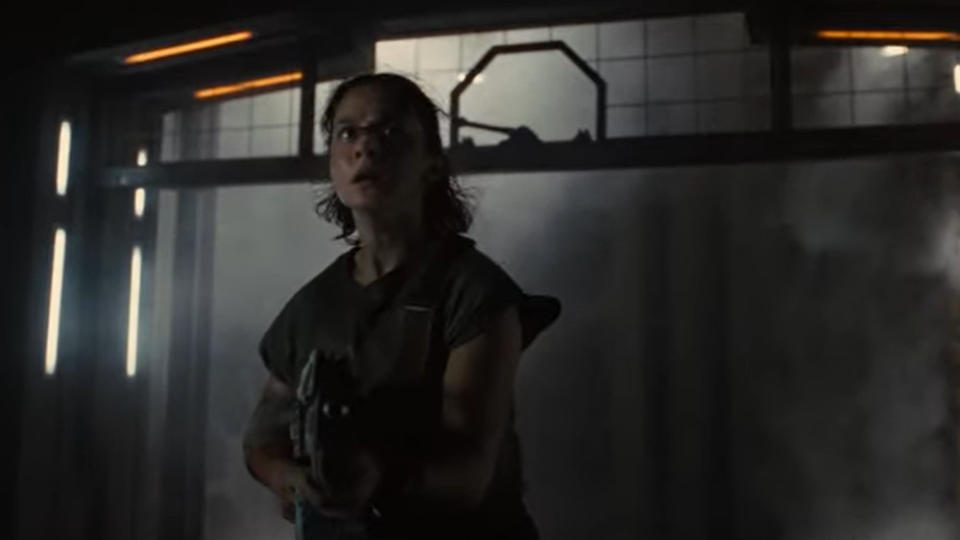Alien: Romulus review — a palm-dampening, seat-gripping, adrenaline-pumping thrill ride
When you buy through links on our articles, Future and its syndication partners may earn a commission.

"There's still power in this relic," says one of the protagonists in Alien: Romulus as he bids to reboot an abandoned piece of tech in the early stages of this new sci-fi horror thriller, and he is no doubt talking too for director Fede Alvarez, who is here rebidding to reboot the Alien franchise, seemingly dormant following the disappointment of the series’ second cinematic prequel, 2017's Alien Covenant.
Alvarez, director of 2013's gory Evil Dead remake and 2016's suffocatingly tense home-invasion thriller Don't Breathe, has set his new movie (co-written with frequent collaborator Rodo Sayagues) in 2142, twenty years after the events of Ridley Scott's Alien and thirty-seven before those of James Cameron's Aliens. In genre terms, his film also slots between those two films, occupying a niche somewhere between the creepy haunted house in space feel of Alien and Aliens’ gung-ho combat movie vibe. Alien: Romulus also, somewhat more unfortunately, trots out a good few of the tics and tropes of the young-people-in-peril thrillers that became the horror genre’s dominant strand somewhere between Scott’s 1979 and Cameron's 1986 films.
Alvarez has said that the inspiration for Alien: Romulus came from a deleted scene in Aliens in which a bunch of kids are running among the workers in the outer space colony where the action takes place. This got him wondering "what it would be like for teenagers to grow up in a colony so small and what would happen to them when they reached their early 20s".
For Cailee Spaeny’s Rain — Alien: Romulus's orphaned heroine (the film’s "final girl" in teen-horror terms) — what has happened is that she and her young friends are stuck on a sunless, disease-ridden, unremittingly grim mining colony called Jackson’s Star. Trapped in serf-like employment with the Weyland-Yutani Corp. (the Alien universe's ruthlessly evil corporation), they have little prospect of fulfilling their dream of making their way to Yvaga III, a seemingly idyllic planet nine years away.
This is why Rain’s ex-boyfriend Tyler (Archie Renaux) comes up with a plan to break into an abandoned Weyland-Yutani space station, the Renaissance, which has recently drifted into orbit above Jackson’s Star, and steal the cryogenic pods that will enable them to put themselves into suspended animation long enough to reach the distant Yvaga III on board their ship, the Corbelan.
So Tyler and a small bunch of friends and siblings — cocky hothead Bjorn (Spike Fearn), secretly pregnant Kay (Isabela Merced), pilot Navarro (Aileen Wu), and the reluctant Rain make their way to the station, along with Rain's surrogate "brother" Andy (David Jonsson, very good). A damaged humanoid robot with a hesitant manner and a penchant for terrible jokes, Andy is an obsolete Weyland-Yutani "synthetic" and his ability to access the corporation’s equipment is vital to the mission's success.
"Should be in and out in thirty minutes," declares the confident Tyler, but his plan quickly goes horrifyingly awry. The derelict space station, with its twin modules Romulus and Remus, is not entirely deserted. Something else is on board the station — a former research facility containing alien specimens — and, sure enough, it isn't long before Rain and her unwitting companions find themselves assailed by face-huggers, chestbursters and slavering "xenomorphs" — the full life cycle of the Alien universe’s monstrous creatures.
Adding to their peril — as if anything, given the presence of the alien creatures, could possibly make things more dangerous — the clock is ticking down to the moment when the space station will crash into the icy rings surrounding the mining planet below…
Alvarez's choice of protagonists does not initially inspire great confidence that he will pilot his Alien vehicle to success. Compared with the grumpy, grizzled crew of the Nostromo in Alien, played by the likes of John Hurt, Harry Dean Stanton and Yaphet Kotto, or the squad of tough and cynical army grunts in Aliens (including Michael Biehn, Bill Paxton and Jenette Goldstein) — the "young adult" characters in Alien: Romulus are all too bland and forgettable. And, as good as Spaeny is as the film’s gutsy heroine, she's a puny lightweight set against Sigourney Weaver's statuesque Ripley. Similarly, despite the script’s half-hearted efforts to mine thematic richness out of the story’s mix of real, surrogate and mythological siblings, Alien: Romulus lacks the strange and unfathomable psychological depth of the original film.
Yet despite all this, where it really matters, Alien: Romulus undoubtedly works. Its world-building is impressive, with Alvarez and his team creating suitably rusting, retro-futuristic spacecraft and archaic computer kit that would plausibly fit between the technology on display in Alien and Aliens. The favoring of practical effects over digital ones enhances the film's lived-in immediacy, while the echoes of Jerry Goldsmith and James Horner’s music for Alien and Aliens in Benjamin Wallfisch’s gripping score adds to the film’s pleasingly old-school feel. Most importantly, when the plot kicks in and the action kicks off, Alvarez gets us by the throat, skilfully mixing claustrophobic dread, race-against-time tension and grisly shocks, and taking us on a palm-dampening, seat-gripping, adrenaline-pumping thrill ride.
Alien: Romulus premieres exclusively in movie theaters on Friday, August 16.
